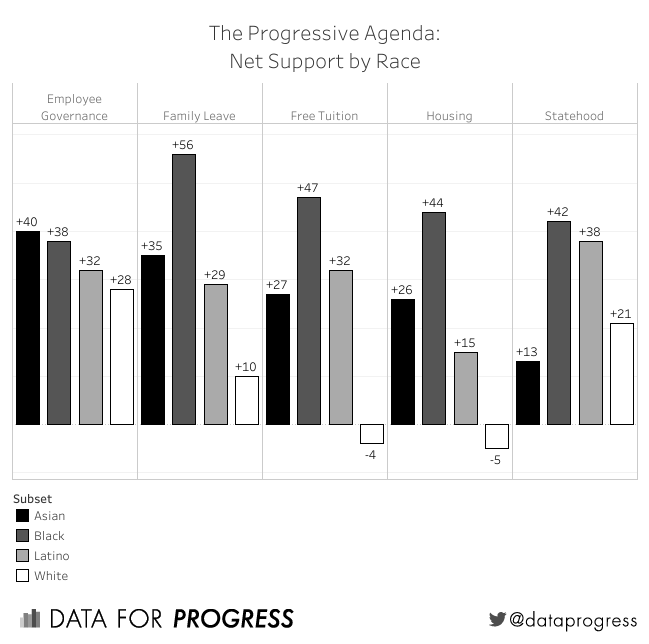data for politics #17: Building Winning Coalitions
By Jason Ganz (@jasnonaz) and Sean McElwee (@SeanMcElwee)
The single most important question for Democrats going into the 2018 midterms is how to construct a coalition that fires up the base while bringing in, or at least not alienating, swing voters. Through The New Progressive Agenda Project (NPAP) with Civis Analytics, we have identified a set of policies that are tremendously popular with the Democrats base while remaining acceptable to many outside of the party base. Contrary to Beltway Wisdom, we find that policies popular with likely 2018 voters are are progressive, not centrist, policies.
For example, employee governance is perhaps the most “radical” policy we polled. The idea that workers should have a say in how their companies are run has a net favorability of +38 percentage points among black likely voters, +28 points among white likely voters and net favorability in every single congressional district in the country. Tammy Baldwin, a Democratic Senator in swingy Wisconsin, is leading on this policy. For all the takes about why progressive policies can’t win across the country, politicians like Baldwin and Brown in Ohio have found that embracing progressive policies can help them beat back one of the most powerful force in the country: the Koch Brothers (See Baldwin’s case here). In Florida's recent Democratic Gubernatorial primary, Andrew Gillum showed the power of a progressive agenda to mobilize black Democratic primary voters.

Other issues see a more defined gap along racial lines. Family leave has a whopping +56 approval among black likely voters and +35 among Asian likely voters with white likely voters being a more modest +10. Family leave is an excellent illustration of the kind of policy that Democrats should be looking for. Extremely popular among the base of people of color while being favored by enough whites to enable a winning coalition -- and, most importantly, all while easing the financial burden on new parents.
Free college and housing reform see majority support among POC and net negative support among whites. Even so, Democrats can not and should not ignore these issues, as they are a clear moral imperative and are popular in much of the country (explore our maps here). Even in these cases, the -4 and -5 support among white voters for free tuition and housing respectively only represent a small favorability gap compared to the strikingly strong support among black voters (+47 and +44).
That’s not to say there are no issues where we see significant negative support among whites and broad support among POC. Turning to the Data for Progress polling of eligible voters with YouGov Blue, we have found that POC have net support for both a 90% millionaires tax and reparations. Meanwhile whites somewhat oppose a 90% millionaires tax and more vehemently oppose reparations.
One potentially significant finding is that Universal Basic Income and Universal Basic Wealth both have significant support among POC and support among the white working class. The only group to oppose these measures is college educated whites -- and it makes sense that the group with the most entrenched wealth would be opposed to a more equitable distribution.
The way forward for the Democratic party is through recognizing that the base of the party is composed of POC who largely support the New Progressive Agenda and other progressive reforms, while peeling off just enough white voters to maintain an electoral advantage. The way to do this is not to moderate on the core progressive issues, but rather to present a bold agenda which can appeal to the new Democratic coalition.
Jason Ganz (@jasnonaz) is a senior adviser at Data for Progress.
Sean McElwee (@SeanMcElwee) is a co-founder of Data for Progress.

